The Evil of Good and the Good of Evil, Part 2
Weapon and Tool: On The Double Edged Natures of Words, Logic and Reason
It was when I said, "There is no such thing as the truth," That the grapes seemed fatter. The fox ran out of the hole. You....You said, "There are many truths, But they are not parts of a truth." Then the tree, at night, began to change, Smoking through green and smoking blue. We were two figures in a wood. We said we stood alone. It was when I said, "Words are not forms of a single word. In the sum of the parts, there are only the parts. The world [is to] be measured by eye"; It was when you said, "The idols have seen lots of poverty, Snakes and gold and lice, But not the truth"; It was at that time, that the silence was largest And longest, the night was roundest, The fragrance of the autumn warmest, Closest and strongest.
(P164, by Wallace Stevens The Palm at the End of the Mind: Selected Poems and a Play ed Holly Stevens NY: Vintage Books, 1972. Slightly edited.)
🙏 If this essay gives you some pleasure and/or an ‘aha’ benefit become a paid subscriber. 🙏
🙏 Thank you. 🙏
Playlists
Spotify
YouTube Music
YouTube movie clip, philosophy, science, Buddhist and psychology videos.
Introduction to Synchronicity Mayhem
In part 1 of ‘The Evil of Good and the Good of Evil’ I arrived at the surprising conclusion that evil doesn’t exist as an objective measurable thing, not even by the ostensible truth of its fruits. Evil is ‘simply’ to not see correctly what is true. Here I’ll add that that applies to objective or subjective cognitions. And this was a big surprise to me because it contradicted what I thought might be an adequate definition of evil.
Jasun Horsley commented there that if he had to define evil that
I would say it has to do with what is anti-life, and that this has to do with the intentional distortion of reality.
That is close to my current understanding that evil is misperception, although for me it would be without any particular reason, intentional or not. And I suspect that with proper embodied integration of mind, body and spirit that any misperception, even with elements of intentional distortion, is far less likely to occur.
Since writing that essay last week this week my ‘evil of good’ world has been filled with a panoply of synchronicities flying at me like rain blowing sideways in a storm! I find myself sitting here reaching into my mind’s remembrances of snatched ‘great’ arguments that came to me while walking under the trees, or from something I read by poet Wallace Stevens, secular Buddhist Stephen Batchelor or long dead philosophers Lao Tzu, Chuang Tzu, Montaigne, or the heretical 18th century genius poet-thinker, social and religious critic William Blake. And what set of synchronicities would be complete without Carl Jung alongside Lewis Carroll? Also jumping in with both feet was the delightful and challenging contemporary social critic and friend Tereza Coraggio specifically in her 2022 essay I read this week. Or the talk I listened to a couple of days ago on a ‘Surviving Narcissistic Abuse’ summit about the ‘hidden’ evil of narcissistic people by Sheri Heller. (For a taste of that talk see Heller’s earlier interview ‘The Collective Denial of Evil and its Impact on Psychiatric Treatment’.) Also the recent lecture by gonzo Irish philosopher Uberboyo boisterously and enthusiastically waxing about Nietzsche’s brilliant observations on life-energy and its lack being the reason for the decline of Rome and then later ‘its’ church. Even the US presidential candidate Dr. Shiva Ayyadurai joined the synchronicity torrent party!
And more than them too!
My turning that maelstrom of overlapping ideas into a coherent narrative has become the challenge. Well, that and somehow articulating the connection to the non-existence of ‘evil’ except as the complement to ‘good’ whenever our vision has been cursed by our ego-mind’s delight in being blind and in blinding us to its blindness. The ego-mind is compelled to control the eccentricity of the ‘true’ life-force impulses using false narratives and by distracting us with temporal and temporary sensual pleasures and, perhaps most persuasively and extensively, by false-flagging us with the ostensibly profound ’truths’ that are the siren’s call of logic and reason with their infatuation with the false-perception that safety is to be found in external ‘things’ like the unchanging stillness of Confucius’s perfectly fixed words† and in ‘single vision and Newton’s sleep!’
Now I fourfold vision see, And a fourfold vision is given to me; ‘Tis fourfold in my supreme delight And threefold in soft Beulah’s night And twofold always. May God us keep From single vision & Newton’s sleep! –– From Letter to Thomas Butts (1802)
†Confucius was cited by Tereza Coraggio in “Nina Jankowicz the Warbling Warmonger: Shows How To Hidealittle Hidealittle Lie”.
I checked for Tereza’s Confucius source and found her citation came from The Analects Book 13. I’ve extended her citation here:
Confucius’s key theory of language is known as the "Rectification of Names." In Book 13 of The Analects, when asked about the first measure to be taken in order to improve the administration, Confucius replied, "It would certainly be to correct language" (159). He further explained why the rectification of names [words and language?] is imperative:
If language is incorrect, then what is said does not concord with what was meant, what is to be done cannot be effected. If what is to be done cannot be effected, then rites and music will not flourish. If rites and music do not flourish, then mutilations and lesser punishments will go astray. And if mutilations and lesser punishments go astray, then the people have nowhere to put hand or foot. Therefore the gentleman uses only such language as is proper for speech, and only speaks of what it would be proper to carry into effect. The gentleman in what he says leaves nothing to mere chance (p159 The Analects Bk 13 cited by Geoffrey Thomas my emphasis).
I find it interesting that Confucius has tacitly suggested that ‘mutilations and punishment’ are okay if they are done under the auspices of correct language. And it hints at his authoritarian nature much like that which was hidden within Chomsky’s opus and that was revealed to us in convidiana with his call to corral and abandon the uninjected, perhaps a tamer form of mutilation. See
The Taoist writer Chuang Tzu mocked Confucius with a biting humour because Chuang Tzu had eyes to see that beneath Confucius’s morality and fixations on correctness in all things, not just words and language, there is an authoritarian substrate of rigidity and stiffness that aligns with things dead and is therefore antithetical to the Tao, ie the energy of Life. See Zhuangzi's Critique of the Confucians: Blinded by the Human or as written by Chuang Tzu in the delightful Wandering on the Way: Early Taoist Tales and Parables of Chuang Tzu Tr. with introduction by Victor H. Mair.]
And this reminded me of a lovely, not-in-the-book scene, of a movie adaption of Pride and Prejudice with Greer Garson and Lawrence Olivier:
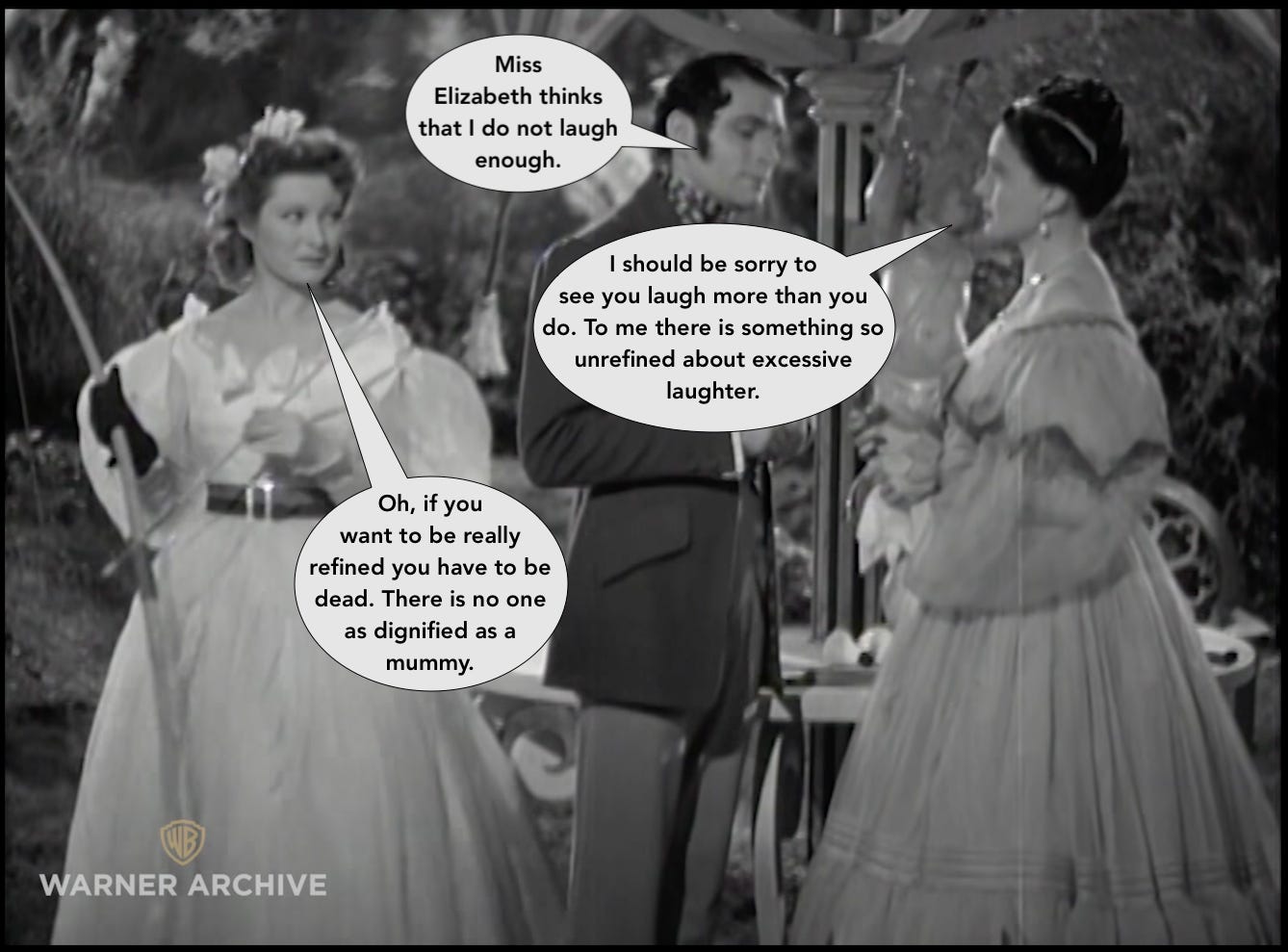
When Darcy is directed by his fiancée to laugh less because laughter, ie ‘life’, is undignified, Elizabeth Bennett retorts that true dignity can then only be found with the mummified.
Tereza’s source cited the verb ‘fixed’ and the translation above cited ‘correct’, as the requirement to put language in order in order to fix/ correct governance and stop its errors in mutilations (not the errors of mutilations). In this context ’fixed’ and ‘correct’ have almost the same meaning in English, although ‘fixed’ has a stronger emphasis in being unmoving, like a fixed star, or as in the fixation on an idea, etc. ‘Correct’ emphasises an ethical or moral tone, as in ‘proper’. I think that these are interesting tells about the desire of Confucius and unconsciously, as with the Chomsky Affect, with his adherents who are likely denying the impermanence of life in all aspects because to fix it, correct it is to keep it from changing. Unconsciously this is a form of death, because it is only the dead things that are ‘fixed’ to some extent, which was Elizabeth Bennett’s sharp point to Darcy. Although even the mountains change (if we are willing to accept as a metaphor mountains as ‘dead’ matter) and corpses decompose until their bones are left to be shifted by the earth’s movements, or when they are rudely in the way of the next person’s burial.
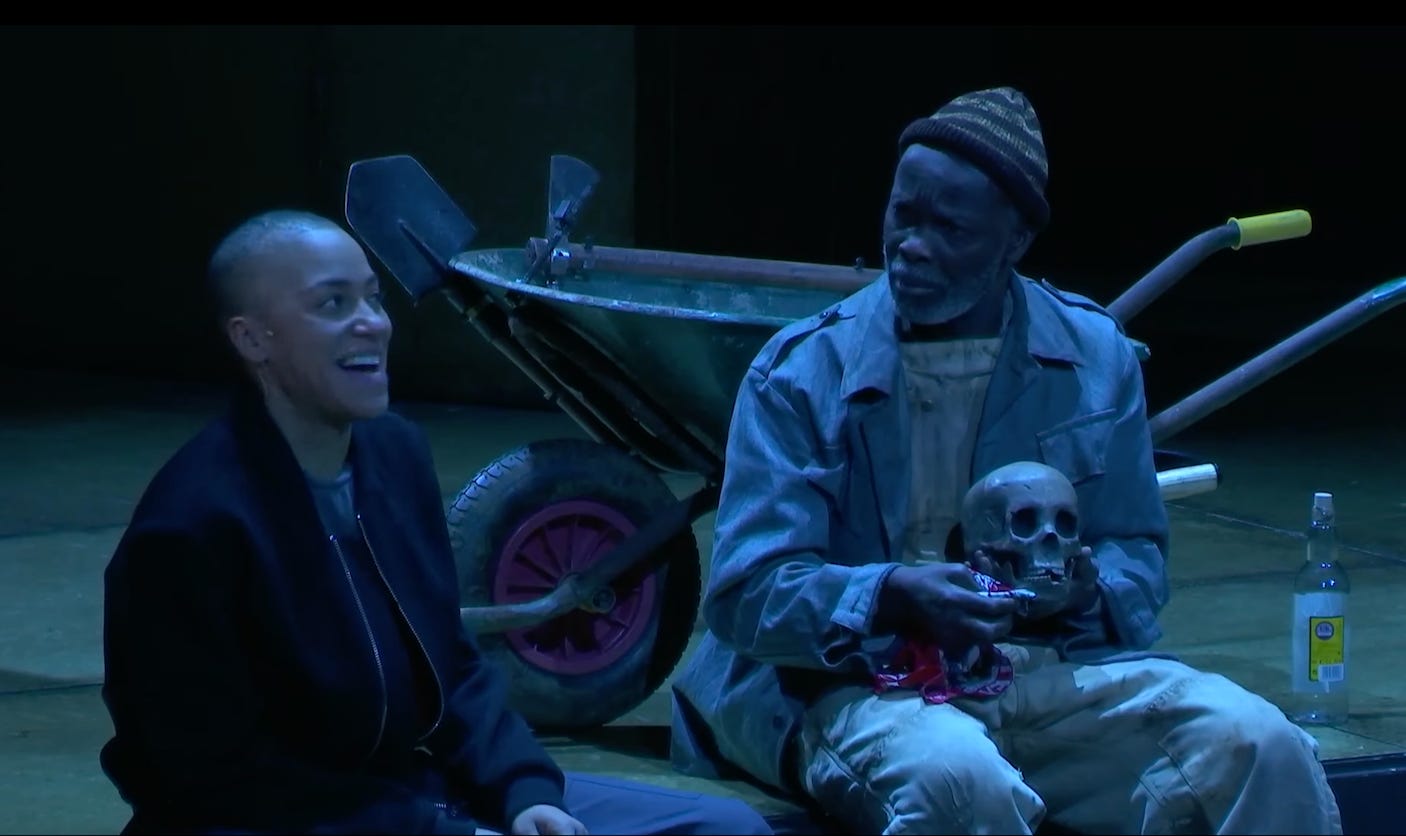

“Begin at the beginning,” the King said gravely, “and go on till you come to the end: then stop.”
Okay, I guess, although I’d thought I had already begun. I’ll begin, again, with an ancient question: how do we know that what we see is true? This has been wrestled with likely not too long after the development of cognition and then of pictures of what we saw and then the words we humans developed (or were given?) to describe the pictures that we saw. It may have been shortly after that that we began to shift our centre of emotional energy out of the body. The body has a very strong awareness of truth when fully embodied, and the ego-mind likes to shift us out of it into past and future, something pictures and words make significantly easier to do than simply being present with what is in front of us. For example, there are strong arguments that in the development of pictures and also iconography that oftentimes the images were not mere representations of the object. They became in the mind and mind’s eyes, a manifestation of what the object’s represented in some way. That feeling-energy is still with us in how religious and even personal altars are built and interacted with. (I recently encountered that when I read the biography of Catharine Burroughs, the confirmed Tibetan Brooklyn Buddhist and her obsession with building a perfect and ‘proper’ Tibetan stupa on American soil. The Buddha from Brooklyn by Martha Sherrill.)
And that impetus might be part of the fascination and push for the replacement of humans with various simulacrums by the self-proclaimed god-humans striving to control the uncontrollable thing we are all a part of, called Life. NB: At the exact time that I was writing that sentence Macy Gray’s cover of Radiohead’s song ‘Creep’ came into my ears, with the lyric: ‘I want to have control’. And I laughed because the powers that be WHO want to fix our words and lives are downright creepy in their presentation to the world and in their eugenicidal actions.

Newton’s visionaries and Voltaire’s bastards would immediately discard as preposterous any idea of these material objects, altars, mountains, bodies, as being alive in a meaningful way by simplistically categorising them at best as just inert matter and hence utterly controllable. ‘Hackable’ as Yuval Harari has said, likely more as a cautionary threat rather than the promises that Schwab has been eulogising about. See ‘Yuval & Russell: You Must Remember This, A Kiss Is Just A Kiss …’ by Tereza Coraggio who dug into Harari for more than a 10 minute clip.
However for many many more years than the last few hundred, many distant past thinkers in the west and east thought otherwise. A few decades ago Fritjof Capra explored the confluence of such eastern thought with modern physics in The Tao of Physics: An Exploration of the Parallels between Modern Physics and Eastern Mysticism. And recently I’ve been exploring Gautama Buddha’s concept of dependent origination (aka conditioned arising) that likewise contradicts the idea of dead matter. And Morris Berman does a great examination of the false-narrative of Newton’s sleep in his excellent trilogy, Reenchantment of the World, Coming to Our Senses: Body and Spirit in the Hidden History of the West and Wandering God: A Study in Nomadic Spirituality.

There is a space-time raft of physical/ non-physical theories being explored in various guises that reject Newton’s sleep, which include and are not limited to, quantum mechanics (super-)string theory, the multiverse hypothesis and the anthropic principle. And it is being fully confronted by people like Rupert Sheldrake and ‘Morphic Resonance’, Veda Austin who has followed the research that showed the sensitivity of ice crystals to human emotions by Masaru Emoto and the idea of water memory by Luc Montagnier.
How Can I Know What is Going On, Up, Down and All Around?
Who is correct in their vision of Life? Is it possible to determine what is and what is not the evil of improperly seeing Life, ie of seeing Life itself as true when it is false, and as false when it is true? That is the first of the yogic kleshas and first of Gautama’s Eightfold Path to reduce suffering. Are words helping us or hurting us? Is it our body’s eyes that misperceive, or is it the mind’s eye and thought that creates the distortions? For now I’ll leave these as rhetorical, although proper yogis and yoginis and Buddhists will already have an inclination of what may be possible answers.
On Schooling and Being Schooled as Rockefeller’s Woke Bomb Factory
When I talk about this kind of thing I usually include the observation that our school system — which I recently learned is a Rockefeller developed institution with the sole purpose of creating cretins who will unthinkingly feed the dragon’s insatiable appetite for more wealth — mis-teaches (deliberately?) physics in the non-sciences and in grade school with the effect of binding the majority of students into Newton’s single vision of dead life and officially blinding them to all references to the fourfold visions of what is closer to the interdependence and ceaselessly changing quantum nature of living life that has been suggested by a huge range of people like Gautama Buddha up to modern physicists and almost all so-called alt-healing modalities. Rockefeller also owns the allopathic medical schools, and so we hear story after story that Rockefeller nutrition, for example, is a single class that affirms the completely discredited ideas that nutrition is fundamentally calories in and out and has little to do with curing disease.
With that indoctrination practice in school that starts in grade one it has come to pass that the humanities departments of our universities are festooned with “intellectuals” who were taught by our ‘god-science’ -TM (Totally Malicious) a tiny and passé subset of physics that has categorised life as controllable and fixable because it is dead. And as Jordan Peterson and others have argued, the universities’ humanities departments are so dead-woke that they are making themselves irrelevant, especially to men who are being vilified there as evil incarnate. For an interesting discussion on the blindness being imposed by woke delusion watch “Tyranny, Slavery and Columbia U | Yeonmi Park | EP 172”. Peterson cried when Park described her time at Columbia as a waste of time and money. She said that she felt imprisoned by the dictatorial woke misandry and anti-patriarchical ‘ethics’ to which she had been subjected. She described how she was coerced to comply in silence to woke delusion and that she felt more imprisoned by that than she ever did when she was ignorant of what freedom meant before escaping from North Korea via China and being a sex slave to have her eyes blown open with the discovery of George Orwell.

Edward de Vere (aka Shakespeare) Mocked the Language Fixers of His Time in a Very Chuang Tzu-Like Way
When Edward de Vere wrote Love’s Labour’s Lost, he included sharp sarcastic criticism at the effort that was being made at that time to ‘fix’ English. (A remnant of that was the changed spelling of current ’salmon’ versus ‘sammon’ because a ‘fact-checker’ screwed up the etymology.) This was articulated in the excellently researched and annotated The Oxford World’s Classic series of Love’s Labour’s Lost. Passim because I no longer have the book in my library.
Nietzche’s Description of the Enervating Language Practices that Felled the Empires
I was fascinated by Uberboyo’s sharing of Nietzsche’s observation, paraphrased, that it was a fixation on ’fixing’ language, to a large extent, that led to the downfall of Greece and Rome and the Catholic Church: all of them fell prey to the delimited logic of the administration’s obsession to fix as if engraved into stone the rules of law to correct and constrict the meaning of language through codifying laws both secular and Biblical. And then the keepers of the laws used logic and reason to self-servingly get around the laws! Jungian analyst Marie-Louise von Franz makes a similar, slightly nuanced comment about the fall of Greece in her great book The Problem of the Puer Aeternus.
Wow! Sounds like what we are living with now! And almost exactly what Lao Tsu and Chuang Tzu repeatedly cautioned against. For example, from Lao Tzu:
Abandon holiness Discard cleverness and the people will benefit a hundredfold Abandon the rules of "kindness" Discard "righteous" actions and the people will return to their own natural affections Abandon book learning Discard the rules of behavior and the people will have no worries Abandon plots and schemes Discard profit-seeking and the people will not become thieves These lessons are mere elaborations The essence of my teachings is this: See with original purity Embrace with original simplicity Reduce what you have Decrease what you want. (Tao Te Ching translated by Johathan Star, 2001, Chapter 19 my emphasis. For this and other translation go to Green Way Research.)
That was what enervated those social structures, as it is doing with ours today. And has for several decades at least. The ‘adminstrators’ became blind to language as being alive and subject to eccentricity and with it vitality. Language became a dead and deadening tool that vampire-like sucked the life-force energy out of the society with the effort of fixing words in order to bypass their own word-centric fixities. (My paraphrase.)
What about the economy? What about business? Yes, what about them? When I completed my degree in economics I left it stunned and angry that what was taught was mostly ungrounded religious bullshit, word salads disguised as pseudo-science. With today’s jargon, I’d call it woke. And my 34 years in the corporate telecom saw woke invade there too, long before ‘woke’ was a word synonymous with aggressive delusional stupidity. I experienced, in the engineering department where I wrestled with the ‘true’ requirement of seeing how complex the reality of engineering for civil design is. The department was eviscerated and replaced with untrained engineering newbies with no idea what to do while being instructed by the MBA wokedom’s love of disengaged-from-reality plans aka delusions. I saw this happening all around me very aggressively beginning in the late ‘80s in Canada. The MBAs (More Bad Advice) were sucked into the enervation of believing that creating cute phrases for unworkable plans while reducing staffing, wages, benefits and ‘gifting’ the workers the lowest cost trinkets they could find as if those trinkets were a vitalising gold. Our economy at all levels has been imploding with the explosion of clever rules and the bizarre economic veneration of greed aka profit-maximising as a social/ economic good. We are living everything that Lao Tsu cautions against in that Verse 19.
In a bizarre synchronicity, I read Stephen Batchelor’s descriptions of almost exactly the same thing contributing to the downfall of Tibet and especially Tibetan Buddhism: they had experienced a decline of their collective life-force energy that had been drained into arguing about the wordy importance of various ghostly gods. Which is an example of a ‘Buddhist’ practice going 100% against what Gautama taught about gods as a distraction from an embodied practice that will reduce the level of suffering in this challenging and oftentimes uncomfortable physical existence.
This dispute [over a particular god the Dalai Lama doesn’t like] marks another phase in the breakdown and disintegration of the Tibetan state. The gods don't work anymore. However you explain it. Tibet's ancien régime failed in its primary duty as a government: to guarantee the integrity of the state and ensure the security of its people. The lamas were convinced that powerful and invisible protectors safeguarded Tibet against its enemies. Geshe Dhargyey solemnly told our class at the Library in the early 1970s that the occupying Chinese army in Lhasa was almost defeated when the protectors caused an outbreak of dysentery among the troops. In reality, though, the Tibetans' occult defence shield was useless against dialectical materialism and the guns of the People's Liberation Army. With few exceptions, the rulers of Tibet failed to appreciate how fundamentally the nature of geopolitics in central Asia had changed during the course of the twentieth century. Now, fifty years later, the exile community supported by a fervent body of Western Buddhists is still squabbling over which protector god has the greatest clout (p209 Confession of a Buddhist Atheist by Stephen Batchelor. My emphasis).
Jung as Prophylactic Defence Against Fixating on Fixing Words Because it is Ultimately Futile
In Man and His Symbols, the anthology Jung edited, Jung wrote in the first chapter on the difference between a ‘sign’ and a ’symbol’. A sign is dead: it has no meaning in life beyond what it immediately represents. Its meaning has become fixed. A symbol, on the other hand, is pointing to something, a meaning or hint of something that the mind doesn’t quite grasp. It is still alive with the possibility of change, growth and expanded awareness. I suspect that this was likely the primary reason the perfectly fantastic logic behind fixing language perfectly by building it from ‘the ground up ego-mind down’ on sound rules of logic and rhetoric didn’t work. Esperanto was/is a woke-effort without the life-giving energy of having meaning beyond the words ‘correctly’ built with logic and reason that likely is going to ‘naturally’ expand into what it doesn’t see, the vitality of our personal and collective unconsciouses.
In my recent essay
I explored some new perceptions of what constituted my experience of having been mothered by a highly ordered likely malevolent sociopathic narcissist who used empty platitudes as her teaching tool. With this essay it clarified the meaning of ‘dead’ words. They had no life to inspire us in any way. And there is a confirmation of that deadness to Terry’s language. Sister number 2 convinced Terry to write something of her life, a short bio, in the months preceding her prescribed termination by cancer. She stopped after only a few pages and months before death and those few pages she wrote were flaccid, lifeless gestures perhaps towards a postured spirituality she had posed. ‘What did you think?’ I asked sister #2, after sharing my observation. ‘Yes, mom's stories about her life are sadly flat,’ sister #2 replied.
And in my communicate with sister #2 she replied to the observation I had discovered that ’our childhood parenting was really a steady stream of emotionally dead platitudes.’ She astutely wrote back:
Surely the spoken part of parenting must be a tiny fraction of what gets transfered? What was she really communicating through those oft repeated platitudes? That she felt so unsafe that she held up an illusion of reassuring familiarity? That she had hidden things pressing up in her that she was keeping suppressed? That she was afraid of life? Yes, we probably received all those copes from her. But I think when she was younger, she was probably less afraid - how it usually goes as people age, they shut down more. So, my intuitive sense of our first years is of her focusing on showing dad a good time and using sex to secure the relationship. Which turned to resentment at some point, because of course it would. So we got that imprint too.
That is so obvious! And yet Terry supplied us with completely ‘fixed’ and ‘corrected’ words and language by using lifeless platitudes. And that did not stop the non-verbal communication which is, of course, probably about 80 or 90 percent of meaningful communication. And often 100%. No amount of Confucian language fixing or correcting with fully disclosed and accepted rules of logic, rhetoric and definition will ultimately fix communication. Too much is either unconscious or intuitive or contextual or inferred or tacit or subjective to unspoken tenets or past experiences, shadow projections, dissembling, psychopathy, etc etc etc. Confucius was a past example of today’s convidiana intellectual: clever fools deluded by brainy ego-blindness that they are not authoritarian and are not willing to kill others even when certain conditions have been met.
This inalienable weakness of words and language, that can easily become a weapon, has been more deeply understood — or perhaps more openly expressed — in the Eastern than in the Western philosophical and living worlds. In the East they write koans to connect us to the meaning beneath the ‘fixed’ meanings of words. In the West we write tomes to try to lock down and fix the meanings of words. And after millennia of that enevating effort have yet to successfully complete that task. For example compare Lao Tzu’s pithy and engaging Tao Te Ching versus the highly lauded dense and very difficult to read Being and Time by Martin Heidegger which, imo, doesn’t in any way improve life by being uplifting or by reducing suffering.
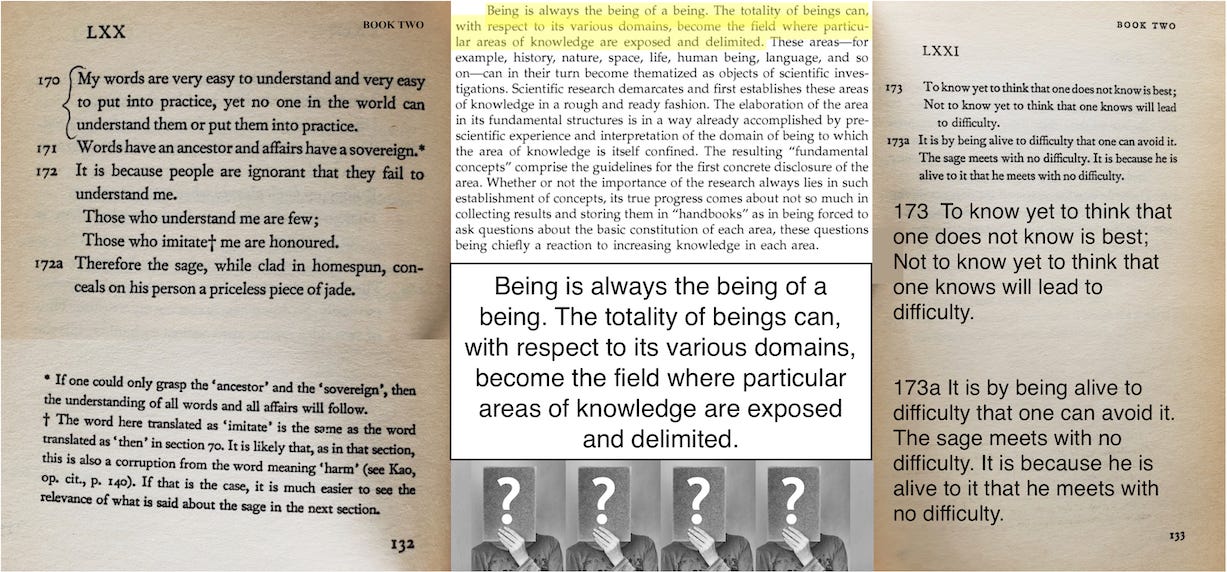
Chuang Tzu, a top 10 favourite philosopher, tied with Edward de Vere (aka Shakespeare)
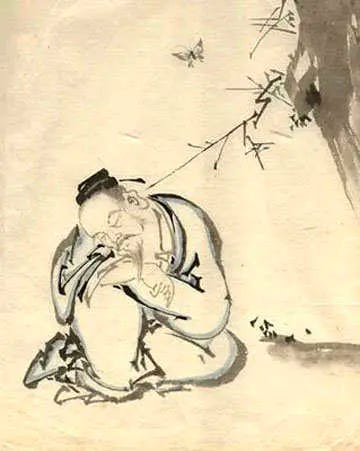
If words were satisfactory, we could speak the whole day and it would all be about the Way; but if words are unsatisfactory, we can speak the whole day and it will all be about things. The Way is the delimitation of things. Neither words nor silence are satisfactory for conveying it. Without words and without silence, our deliberations reach their utmost limits (p266).
And:
A fish-trap is for catching fish; once you've caught the fish you can forget the trap. A springe is for catching hares; once you've caught the hare you can forget about the springe. Words are for catching ideas; once you've caught the idea, you can forget about the words. Where can I find a person who knows how to forget about words so I can have a few words with him?
(Both quotations from Chuang Tzu. Wandering on the Way:Early Taoist Tales and Parables of Chuang Tzu. Toronto: Bantam Books, 1994. Translated by Victor H. Mair.)
Meaning and Meaninglessness: Weaponising Words
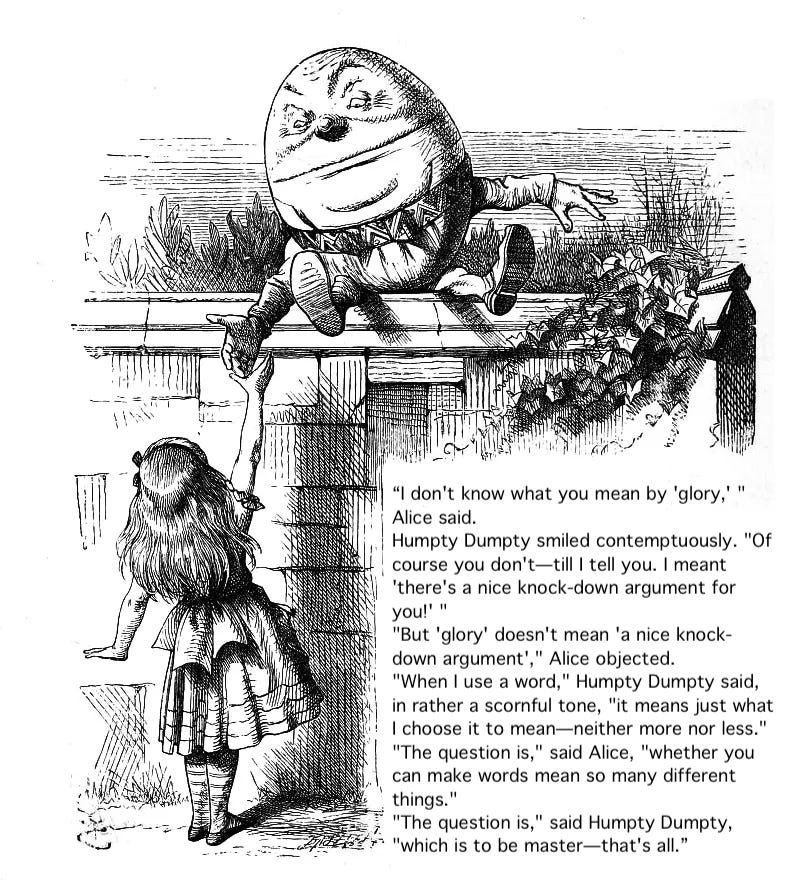
Tereza Coraggio’s essay ‘Nina Jankowicz the Warbling Warmonger: Shows How To Hidealittle Hidealittle Lie’ delighted me with the playful Lewis Carroll’s prescient Humpty Dumpty. He elucidated the last 100 plus years of the logically applied use of propaganda by the know-what’s-best-for-us elites. With that language tool weapon they confound the citizenry to give themselves free reign to run the world to war, to paraphrase Noam Chomsky’s elaboration of the purpose behind Edward Bernay’s advocacy of the requirement for propaganda to run correctly a ‘democracy.’ (See Propaganda by Edward L. Bernays and with an introduction by Mark Crispin Miller.)
My partial transcription from Tereza’s spoken essay:
~1:25 Logic is your friend. Data can be suppressed or manipulated. But logic is the rules for organised thinking, or discourse. It’s something that has to be applied consistently to all sides or it’s not logical. So ethics and logic and consistency are all synonymous. The only way you can push back against injustice is by pointing out the inconsistency in a rules application. That’s the sole job of a lawyer. The opposite of rule by logic, or rule by law, is rule by arbitrary authority or dictatorship. Now every word that gets used in a law has to be defined. And there’s rules for good definitions. … [Without good definitions and enforcement of those definitions] we don’t live in any kind of democracy.
~3:14 Let’s look at words themselves. A noun is an action of aggregating a set of things according to some common denominator. So something like ‘disinformation’ has to have a set a rules that distinguishes it. When Confucius was asked what the first thing he would do if he was the ruler, he said ‘Fix words.’ What that means is that you give them a definition that doesn’t change. Which would be the opposite of Humpty Dumpty in Alice in Wonderland who said:
(I’ve extended the citation beyond what Tereza included.)
“I don't know what you mean by 'glory,' " Alice said.
Humpty Dumpty smiled contemptuously. "Of course you don't—till I tell you. I meant 'there's a nice knock-down argument for you!' "
"But 'glory' doesn't mean 'a nice knock-down argument'," Alice objected.]
"When I use a word," Humpty Dumpty said, in rather a scornful tone, "it means just what I choose it to mean—neither more nor less."
"The question is," said Alice, "whether you can make words mean so many different things."
"The question is," said Humpty Dumpty, "which is to be master—that's all.”
So Humpty Dumpty uses a rhetorical trick there, because he gives the words themselves agency and says ‘I am the master of the words’ and by doing that he makes himself master of the argument. Master over Alice because whoever defines the question wins the debate. So if you can master the words you are pulling something over on people because those words have power.
George Orwell described this throughout much of his writing most famously in 1984.
And of course we have seen it being used flagrantly during convidiana, perhaps directed by the CIA Mockingbird Media, (The CIA’s Shaping of US history, Operation Mockingbird: Some Unpopular History of the United States by Richard L. McManus). Or maybe the propagandists controlling the world media from the WHO/UN and/or the WEF.
In a bizarre synchronicity I happened by pure ‘fluke’ to discover that poet Wallace Stevens used this same ‘argument’ in a short play he wrote, with a lovely twist. Ah, I love how words can dance the twist, quick step and fox trot all at the same time:
CAT: He translates fleurs rouges by tawny flowers.
BROOMSTICK: Why not?
CAT: But, of course, rouges means red.
BROOMSTICK: A man with so firm a faith in the meaning of words should not listen to poetry.
CAT: Broomstick!
Bowl turns to the frontispiece of his book. Cat looks furtively at the portrait there.
BOWL: I say tawny because it is obvious that Claire Dupray means tawny.
BROOMSTICK: Her portrait tells you that?
BOWL: Yes; and her age tells me. She cannot be more than twenty-two.
CAT: And at twenty-two one does not like red flowers?
BOWL: At twenty-two, with eyes as large as those of Claire Dupray, with hair combed as a girl combs her hair-concealing in its arrangement the things it begins to disclose to her and then, most of all, with the look she has here, one goes in for things that go with one's own mystery.
BROOMSTICK: And, of course, red flowers and one's own mystery-
BOWL: Are incongruous (p24-5 Bowl, Cat and Broomstick — A Play by Wallace Stevens The Palm at the End of the Mind: Selected Poems and a Play ed Holly Stevens NY: Vintage Books, 1972 my emphasis).
Defying the King: A Premature Ending
Well, as a human having lived under the punches of western educational bully indoctrination and ‘love’ of words as addictive distraction, I’ll end Part Two here with the intention of continuing it into Part Three. I’ve not really gone beyond words as weapon here. Maybe haven’t even quite finished doing that. The next instalment is to quickly finish words/ language as weapon and jump into words as liberation.
🙏 If this essay gave you some pleasure and/or an ‘aha’ benefit become a paid subscriber. 🙏
🙏 Thank you for reading. 🙏
For part 3
Playlist:
Spotify
YouTube Music
YouTube movie clip, philosophy, science, Buddhist and psychology videos.
And I’ll close with two offerings.
1) An old poem that I wrote in two parts and put part 1 to music. ‘Cotton for Comfort’, which is the reflections of a corpse returning to the earth.
2) A beautiful piece of wordless music, after all these words, exquisitely played on a harp.
‘Cotton for Comfort Part I’ spoken with music here.
‘Cotton for Comfort’ I The cadaver wanted to signal the world with more than obvious signs of her mortality. The remains of the she she once was was not all that she was! But her tongue remained still, thoughts stillborn under the unbearable weight of entomological driven corporal entropy. What means thoughts when their expression cannot reach even the hope of confusion? The cadaver remembered all her apprehensions, understandings and now even their misses. All of them. Misses. Missus. Masses. Mass. Mas. Maws. Mauls. Mulls. Mulligans! Now that is a great word! Missed. Mist. Miss. Misses. Where's the mulligan? The cadaver wondered at the state of her body. It would seem, by the sights she couldn't see, and the sounds she couldn't hear, that she had been abandoned somewhere wild, wild where the wild things are. Where the wild things were returning, with a macabre dance, her once complex interleaving of molecules, cells, to the more natural chord of thrumming humming humus. Humus! Hum Us. Humour Us. Humorous! She wondered that she could hear that chthonic humming now that she couldn't hear words that chimed charmingly with an importance she could no longer fashion. Fashion? She began to soundlessly laugh at being alive in vain. Vain. Vanity. Inanity. Insanity. She'd left that morning wearing her badly worn, tired and holey underwear, underwear her mother told her not to be seen dead in, but in which she felt natural. Nature all. All Nature. All Natural. Cotton for comfort. Comport. Come apart. Be apart. Be a part of … wordlessness. II It was my mother who identified me. Not by my remains, For the little that remained of me was comprised of the natural white anonymity of fleshless bones. Sex, once curvaceous and vibrant and fetid had become a dry geometric puzzle, the curve of the pelvic girdle and coccyx the sere mystery of skull and bone density, agéd clues in de-gummed teeth and voided cranial sutures. It was by my clothes, the clothes I'd been killed in, the made of comfortable cotton clothes that so affronted my mother's sense of social propriety, that became the means of my escape from the unmarked grave of an anonymous de-animation. There were tears. Yet … How to say this? The tears were not for me, now. They are for the simulacrum of a corpulent me that once appeared to exist in the mind's eye, the giddy distracted mind for the gaudy embodied me I once dizzily revelled in. Or, at least that's what I'd like to think I want to remember, to be remembered by by the strangers I was bound to by the soft pillowy cotton delicate strings, designed by and dedicated to the social obligation of family stones. Stones? How to explain this weight? In so far as my skeleton is sensate, I feel compelled to embrace Sei Shonagon's Pillow Book* cant and list my listlessness as follows: cross bones, tomb stones, head stones, hearth stones, heart stones. Cajones, nerve, verve. Vicissitudes. In the morgue I rest, un-rued on cold rude un-stained steel, pillowed by the dead sure attitude found solely in an unremarked gravestone, wet from an unexpected cloudburst, and in the lost certitude of my lonesome anonymity. *Note: The Pillow Book has been called a book of lists because Sei Shonagon included lists of all kinds. And it is considered one of the greatest of Japanese literature. It has some great and quotable observations, such as: In life there are two things which are dependable. The pleasures of the flesh and the pleasures of literature. — Sei Shonagon circa 1000 AD
Wordless Song of the Essay




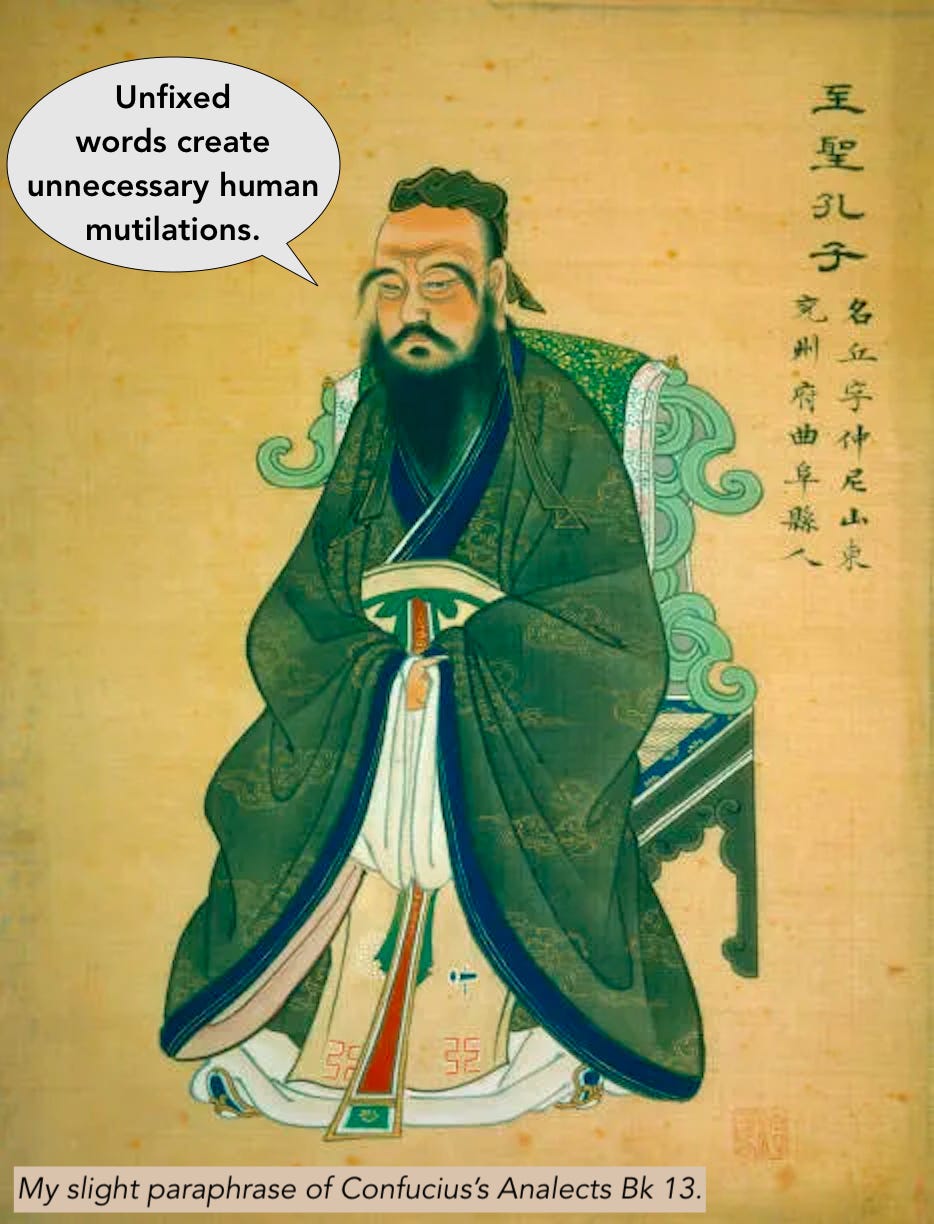






What you describe with language changing things also applies to physics and the other sciences.
Quantum theory is a result of mathematics hijacking science and influencing the interpretation of the experimental measurements which are inferrances of phenomena.
Even the big bang theory was shoehorned into math leading to confusion which lead to needing "dark matter" and "dark energy" to fulfill the assumption. These days big bang is being challenged.
Here's Heinz von Foerester calling out what the sciences have done: invent more and more imaginary things:
https://youtu.be/ev7e9sfWIJo
I enjoyed this essay thoroughly. To me words are so indicative of the state of the speaker/writer. Despite the dismal state of humanity we are seeing through your words, we can also see your light in the humor and human nonsense/foibles portrayed.